Are you fascinated by the wonders of the botanical realm? Do you find yourself captivated by the lushness of plants, their shapes, colors, and remarkable adaptations? If you have an insatiable curiosity for all things green, then you’ve come to the right place! In this blog post, we will delve into the intriguing world of plant science and botany, uncovering their differences and shedding light on the captivating careers they offer.
While the terms “plant science” and “botany” might seem interchangeable at first glance, they represent distinct disciplines with their unique focuses and specialties. Plant science, also known as plant biology or plant physiology, encompasses a broad spectrum of scientific studies dedicated to understanding the structure, function, and interactions of plants. On the other hand, botany can be considered a subset of plant science, focusing specifically on the study of plants’ taxonomy, classification, morphology, and evolution.
Join us on this botanical journey as we explore the diverging paths of plant science and botany, unraveling the mysteries and intricacies of these vibrant fields. Get ready to unearth the answers to burning questions like “Who is a botanist?” and “What does a plant biologist do?” So grab your magnifying glass, put on your thinking cap, and prepare to embark on a thrilling exploration of the green world!
Keep scrolling to discover the fascinating differences between plant science and botany, and the captivating career opportunities each field holds in store!

What’s the Deal with Plant Science and Botany
So, you’re curious about the difference between plant science and botany, huh? Well, you’ve come to the right place, my friend! Let’s embark on a journey through the tangled green world of plants and uncover the subtle distinctions between these two fascinating fields.
Plant Science: Where Science and Magic Meet
Ah, plant science, the realm where scientists wield their knowledge like magic wands to unravel the secrets of the botanical world. It encompasses a broad spectrum of disciplines, from genetics and physiology to ecology and biochemistry. Plant scientists are like the Sherlock Holmes of the plant kingdom, using sophisticated tools and techniques to solve the mysteries hidden within the chlorophyll-filled cells.
Botany: The Grandma of Plant Studies
Now, let’s meet botany—the good old grandma of plant studies. Dating back to ancient times, botany is the study of plants that has withstood the test of time. Think of it as the wise and gentle granny who has dedicated her life to understanding plants’ inner workings. Botanists explore plant taxonomy, morphology, and anatomy, making connections and classification systems that would make your head spin faster than a sunflower turns towards the sun.
A Venn Diagram of Plant Science and Botany
So, how do these two fields overlap? Imagine a lovely Venn diagram, with plant science and botany nestled cozily in the overlapping area. While plant science covers a broader range of topics, including molecular biology and environmental science, botany is a more specific branch that focuses specifically on the anatomy, taxonomy, and classification of plants. Picture plant science as the extroverted younger sibling, while botany is the introverted bookworm who prefers spending time alone in the garden.
The Modern Twist: Where Plant Science Steals the Show
With the advances in technology and our ever-growing thirst for knowledge, plant science has taken center stage in recent years. It has integrated various scientific disciplines to unlock the secrets of plants and harness their potential. In contrast, botany, although not as flashy, remains the foundation upon which plant science is built. It’s like a solid oak tree supporting the scientific foliage that grows around it.
So, Which One Should You Choose
Now, the burning question: Should you pursue plant science or botany? Well, it all depends on your wild, plant-loving heart! If you’re drawn to the broader scientific spectrum, eager to explore genetics, ecology, and biotechnology, then plant science might be the perfect fit for you. But if you find solace in understanding the intricate details of plant anatomy and unlocking the mysteries of plant classification, then botany will welcome you with open arms. Ultimately, it’s about following your passion and making a decision that allows you to grow like a mighty oak in the forest of knowledge.
Wrapping Up the Green Adventure
Congratulations! You’ve emerged from the curious rabbit hole that is the difference between plant science and botany. Now equipped with this knowledge, you can impress your friends with your newfound understanding of the plant kingdom. Whether you choose to dive into the world of plant science or tread the more traditional path of botany, remember that plants are fascinating creatures that deserve our attention and care. So go forth, my plant-loving friend, and let the seeds of knowledge flourish within you as you embark on this green adventure.
Note: This blog post was lovingly crafted in 2023, a time when plants still continue to amaze us with their awesomeness.

FAQ: What is the Difference Between Plant Science and Botany
Who is a Botanist
A botanist is a scientist who studies plants. They explore various aspects of plant life, including their classification, structure, development, genetics, ecology, and economic importance. These plant enthusiasts play a crucial role in advancing our understanding of the natural world and finding practical applications for plants in various fields.
What is the Salary for Horticulture
Horticulture, which is the art and science of cultivating plants, offers a wide range of career opportunities. The salary for horticulturists can vary depending on factors such as education, experience, job location, and sector. On average, horticulturists in the United States earn around $50,000 to $70,000 per year. However, those in specialized fields or with advanced degrees can earn even higher salaries.
Are Horticulture and Botany the Same Thing
While horticulture and botany share a common interest in plants, they are different disciplines. Horticulture focuses more on the practical aspects of plant cultivation, such as growing and maintaining plants for food, aesthetics, or environmental purposes. On the other hand, botany encompasses a broader scientific study of plants, including their biology, taxonomy, and ecological roles. Think of horticulture as the hands-on cultivation and botany as the scientific exploration.
How Many Years Does it Take to Become a Botanist
Becoming a botanist typically requires a bachelor’s degree in botany, plant science, or a related field. This undergraduate program typically takes four years to complete. However, many aspiring botanists pursue advanced degrees, such as a master’s or a Ph.D., which can add another two to six years of study. The duration ultimately depends on individual goals and the level of expertise desired.
What is the Difference Between Plant Science and Botany
Plant science and botany are closely related but have distinct focuses. Plant science is a broader term that encompasses the study of all aspects of plant biology, including genetics, physiology, ecology, and biotechnology. Botany, on the other hand, specifically refers to the scientific study of plants, encompassing areas like plant taxonomy, morphology, and plant evolution. In simple terms, botany is a subset of plant science that primarily deals with the classification and characteristics of plants.
Do Biologists Study Plants
Yes, biologists indeed study plants! While biology is a vast field that encompasses all living organisms, including animals, plants, and microorganisms, some biologists specialize in plants. These plant biologists explore various aspects of plant life, such as their genetics, physiology, ecology, and interactions with other organisms. They contribute to our understanding of plant diversity, the mechanisms behind plant growth and development, and the important roles plants play in our ecosystems.
What Careers Involve Plants
The study of plants opens up a world of exciting career opportunities. Some popular careers that involve plants include:
- Botanist: Conducting research on plant life, classification, and studying their characteristics.
- Horticulturist: Cultivating and caring for plants in gardens, nurseries, or farms.
- Plant Breeder: Developing new and improved varieties of plants.
- Ecologist: Studying the interactions between plants and their environment.
- Environmental Consultant: Assessing the impact of human activities on plant ecosystems and suggesting conservation measures.
- Agricultural Scientist: Enhancing crop yields and developing sustainable agricultural practices.
- Conservation Scientist: Working to protect endangered plant species and preserve natural habitats.
- Pharmaceutical Researcher: Conducting research to discover new drugs derived from plants.
- Landscaper: Designing and maintaining visually appealing and functional outdoor spaces using plants.
- Teacher/Professor: Sharing knowledge about plants and inspiring the next generation of plant scientists.
These are just a few examples, and the possibilities are vast for those with a passion for plants.
Who is the Mother of Botany
Botany has a rich history with many pioneers, but one standout figure is Theophrastus. Often referred to as the “Father of Botany,” Theophrastus, a student of Aristotle, made significant contributions to the field. In his work “Enquiry into Plants,” he documented and classified a wide range of plant species, establishing the foundation for the scientific study of botany. While he may not be the “mother” specifically, his influence on the discipline is undeniable.
What Does a Plant Biologist Do
Plant biologists explore the intricate world of plant life. They investigate plant anatomy, physiology, genetics, and ecology to understand how plants function and interact with their surroundings. These scientists conduct experiments, analyze data, and publish their findings to contribute to our knowledge of plant biology. Whether they are unraveling the secrets of photosynthesis or studying how plants adapt to different environments, plant biologists play a crucial role in advancing our understanding of the natural world.
Can You Become a Botanist with a Biology Degree
Yes! A biology degree can serve as an excellent foundation for a career in botany. While botany and biology have some overlap, obtaining a degree in biology provides a solid understanding of fundamental biological principles, including genetics, evolution, and cellular processes. With further specialization through coursework or additional studies in botany, you can expand your knowledge specifically in the field of plant science and embark on a path to becoming a botanist. So, if you have a passion for plants and a biology degree in hand, you’re well on your way to joining the fascinating world of botany!
